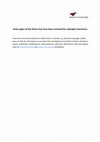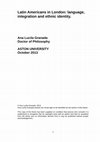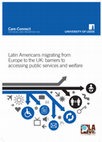Papers by Lucila Granada

This thesis studies the links between language, migration and integration in the context of the &... more This thesis studies the links between language, migration and integration in the context of the 'new migrant' group of Latin Americans in London. It reviews the many ways in which language impacts the integration processes of migrants by influencing people's access to jobs, services, social contacts and information. By focusing on migrants' experiences this research also investigates the ways in which language and identity articulate, as well as the affective variables that are at play in the acquisition of the local language. With a large sector trapped in a cycle of poor command of English and labour market disadvantage, many Latin Americans experience exclusion and poverty. In reaction to this, a sector of the community is campaigning for ethnic minority recognition. This work reviews the debates for recognition and the strategy of organising around ethnicity, paying special attention to the role language plays in the process. The study is based on over two and ha...
Citing this paper Please note that where the full-text provided on King's Research Portal is ... more Citing this paper Please note that where the full-text provided on King's Research Portal is the Author Accepted Manuscript or Post-Print version this may differ from the final Published version. If citing, it is advised that you check and use the publisher's definitive version for pagination, volume/issue, and date of publication details. And where the final published version is provided on the Research Portal, if citing you are again advised to check the publisher's website for any subsequent corrections.

This thesis studies the links between language, migration and integration in the context of the '... more This thesis studies the links between language, migration and integration in the context of the 'new migrant' group of Latin Americans in London. It reviews the many ways in which language impacts the integration processes of migrants by influencing people's access to jobs, services, social contacts and information. By focusing on migrants' experiences this research also investigates the ways in which language and
identity articulate, as well as the affective variables that are at play in the acquisition of the local language.
With a large sector trapped in a cycle of poor command of English and labour market disadvantage, many Latin Americans experience exclusion and poverty. In reaction to this, a sector of the community is campaigning for ethnic minority recognition. This work reviews the debates for recognition and the strategy of organising around ethnicity, paying special attention to the role language plays in the process.
The study is based on over two and half years of qualitative research, which included interviews, surveys, and long-term participant observation within a community organisation and a recognition campaign. Its interdisciplinary perspective allows the recognition of both the intimate links between language and identity, as well as the social and structural forces that influence migrants' linguistic integration. It unveils the practical
and symbolic value that the mother tongue has for Latin American migrants and provides a broader account of their experiences.
This research calls attention to the need for a more comprehensive approach to the study of language and migration in order to acknowledge the affective and social factors involved in the linguistic practices of migrants. By studying the community's struggles for recognition, this work evidences both the importance of visibility for minority groups in London and the intrinsic methodological limitations of monitoring through ethnic categorisation.
Reports by Lucila Granada
King's College London, Latin American Women's Rights Service, 2019
I put up with too much abuse. He mistreated me, he hurt me, and I had to think twice before telli... more I put up with too much abuse. He mistreated me, he hurt me, and I had to think twice before telling the police. But I am not afraid anymore. I have been stepped on for too long and now I stand up for myself. I have rights and I am free."
King's College London, Latin American Women's Rights Service, 2019
Latin American Women's Rights Service, 2019
The Latin American Women's Rights Service (LAWRS) is a feminist and human rights organisation led... more The Latin American Women's Rights Service (LAWRS) is a feminist and human rights organisation led by and for Latin American migrant women in the UK. We support the multiple immediate and long-term needs of Latin American migrant women exposed to intersectional discrimination on the basis of gender, race and migration status, and to violations of their fundamental human rights. We work with women and girls facing violence, exploitation and trafficking, and those enduring difficult living and working conditions in low-paid jobs and facing barriers to social protection.

This report draws from the findings of a small-scale study conducted by Mas Giralt in 2013-4 at t... more This report draws from the findings of a small-scale study conducted by Mas Giralt in 2013-4 at the University of Leeds, which involved 19 semi-structured interviews with key informants from migrant support and community organisations and staff in public services in the UK, Spain and Italy. This study sought to develop a better understanding of the issues faced by people re-migrating (both at origin and destination), and more particularly, of the impacts that recent migration and policy reforms in the UK have had for those newly arrived. The issues identified by this study affected migrant women in particular due to their predominant role as heads of household and family carers. Following these findings, and as a way of ‘giving back’ to the community, an information event was organised in collaboration with Latin American Women's Rights Service (LAWRS) with the funding support of Care-Connect at the University of Leeds. During this event, which was held on 21st June 2014 and attended by over a 100 migrants, a consultation questionnaire was completed with 37 attendees, randomly chosen. The report also presents the results of this consultation, which further illustrate the issues analysed in Mas Giralt’s research, and provides examples of migrant women’s first hand experiences of the barriers highlighted by this study.
Key points:
- Latin Americans migrating from other European Union (EU) countries to the UK face a range of difficulties when settling in London, where they often become employed in low paid,
fragmented and insecure jobs (particularly in the cleaning sector). These difficulties affect women particularly, as they
are often the main carers for children and family.
- Reduced outreach, interpretation and information services from local authorities for new arrivals often result in ‘practical exclusion’ of migrants and their children from public services to which they are entitled, undermining their ability to integrate and secure appropriate standards of living.
- Diminished resources in public services provision and welfare restrictions for recent EU migrants (due to public misperceptions that these migrants overburden the welfare
system) create barriers for vulnerable migrants to access social protection, particularly for women.
- Barriers of access have been identified in healthcare, education, housing and employment, which have particular
detrimental effects for those migrants working in precarious jobs, making them vulnerable to labour exploitation and poverty.









Uploads
Papers by Lucila Granada
identity articulate, as well as the affective variables that are at play in the acquisition of the local language.
With a large sector trapped in a cycle of poor command of English and labour market disadvantage, many Latin Americans experience exclusion and poverty. In reaction to this, a sector of the community is campaigning for ethnic minority recognition. This work reviews the debates for recognition and the strategy of organising around ethnicity, paying special attention to the role language plays in the process.
The study is based on over two and half years of qualitative research, which included interviews, surveys, and long-term participant observation within a community organisation and a recognition campaign. Its interdisciplinary perspective allows the recognition of both the intimate links between language and identity, as well as the social and structural forces that influence migrants' linguistic integration. It unveils the practical
and symbolic value that the mother tongue has for Latin American migrants and provides a broader account of their experiences.
This research calls attention to the need for a more comprehensive approach to the study of language and migration in order to acknowledge the affective and social factors involved in the linguistic practices of migrants. By studying the community's struggles for recognition, this work evidences both the importance of visibility for minority groups in London and the intrinsic methodological limitations of monitoring through ethnic categorisation.
Reports by Lucila Granada
Key points:
- Latin Americans migrating from other European Union (EU) countries to the UK face a range of difficulties when settling in London, where they often become employed in low paid,
fragmented and insecure jobs (particularly in the cleaning sector). These difficulties affect women particularly, as they
are often the main carers for children and family.
- Reduced outreach, interpretation and information services from local authorities for new arrivals often result in ‘practical exclusion’ of migrants and their children from public services to which they are entitled, undermining their ability to integrate and secure appropriate standards of living.
- Diminished resources in public services provision and welfare restrictions for recent EU migrants (due to public misperceptions that these migrants overburden the welfare
system) create barriers for vulnerable migrants to access social protection, particularly for women.
- Barriers of access have been identified in healthcare, education, housing and employment, which have particular
detrimental effects for those migrants working in precarious jobs, making them vulnerable to labour exploitation and poverty.
identity articulate, as well as the affective variables that are at play in the acquisition of the local language.
With a large sector trapped in a cycle of poor command of English and labour market disadvantage, many Latin Americans experience exclusion and poverty. In reaction to this, a sector of the community is campaigning for ethnic minority recognition. This work reviews the debates for recognition and the strategy of organising around ethnicity, paying special attention to the role language plays in the process.
The study is based on over two and half years of qualitative research, which included interviews, surveys, and long-term participant observation within a community organisation and a recognition campaign. Its interdisciplinary perspective allows the recognition of both the intimate links between language and identity, as well as the social and structural forces that influence migrants' linguistic integration. It unveils the practical
and symbolic value that the mother tongue has for Latin American migrants and provides a broader account of their experiences.
This research calls attention to the need for a more comprehensive approach to the study of language and migration in order to acknowledge the affective and social factors involved in the linguistic practices of migrants. By studying the community's struggles for recognition, this work evidences both the importance of visibility for minority groups in London and the intrinsic methodological limitations of monitoring through ethnic categorisation.
Key points:
- Latin Americans migrating from other European Union (EU) countries to the UK face a range of difficulties when settling in London, where they often become employed in low paid,
fragmented and insecure jobs (particularly in the cleaning sector). These difficulties affect women particularly, as they
are often the main carers for children and family.
- Reduced outreach, interpretation and information services from local authorities for new arrivals often result in ‘practical exclusion’ of migrants and their children from public services to which they are entitled, undermining their ability to integrate and secure appropriate standards of living.
- Diminished resources in public services provision and welfare restrictions for recent EU migrants (due to public misperceptions that these migrants overburden the welfare
system) create barriers for vulnerable migrants to access social protection, particularly for women.
- Barriers of access have been identified in healthcare, education, housing and employment, which have particular
detrimental effects for those migrants working in precarious jobs, making them vulnerable to labour exploitation and poverty.